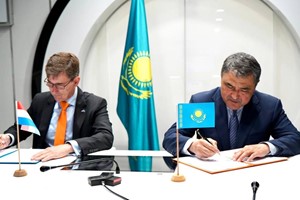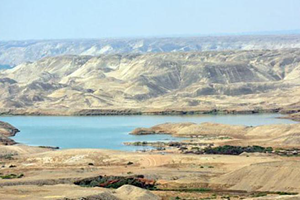Kazakhstan has made significant strides in reforming its water resource management system, addressing climate challenges and ensuring sustainable water use. By integrating advanced technologies, upgrading infrastructure, and adopting innovative policies, the country is enhancing water efficiency and resilience.
Modernizing Water Infrastructure
Kazakhstan manages over 13,000 hydraulic structures, including reservoirs, dams, and canals, vital for agriculture and water supply. In 2024, the government supplied 10.9 cubic kilometers of irrigation water to southern regions, meeting 97% of irrigation demand. The Shardara Reservoir doubled its intake to 4.8 billion cubic meters, reflecting modernization success.
A national program aims to construct 20 new reservoirs, reconstruct 15 existing ones, and rehabilitate 14,000 kilometers of irrigation channels. These efforts are expected to cut water transportation losses from 50% to 25% by 2030, creating additional resources for agriculture and other sectors.
The area of irrigated agricultural land expanded from 312,200 hectares to 462,200 hectares in 2024. Advanced irrigation techniques like drip and sprinkler systems have reduced water use by up to 50%, while nearly doubling crop yields. Farmers benefit from subsidies and training programs that promote water conservation and enhance agricultural productivity.
Digitalization and Innovation
Digital solutions are central to Kazakhstan’s water management reforms. By 2025, the National Water Resources Information System will enable real-time monitoring of reservoirs and provide advanced flood and drought forecasts. The Tasqyn system, currently in development, will enhance emergency preparedness through flood modeling.
In the Kyzylorda region, automated water metering systems are being installed to digitize 3,500 kilometers of irrigation networks. These projects, supported by the Islamic Development Bank, are expected to save 0.5 cubic kilometers of irrigation water annually by 2027.
Expanding Access to Clean Water
In 2024, Kazakhstan allocated 218 billion tenge (US$416 million) to 324 water supply projects, improving access to clean drinking water. Centralized water systems were established in 39 villages, and outdated networks were reconstructed.
By the end of the year, 99.5% of urban and 97.8% of rural populations had access to safe drinking water. The government aims to achieve universal access by 2025.
New Water Code
A new Water Code introduced in 2024 emphasizes sustainable use, water security, and ecological preservation. Its 121 articles include principles such as recognizing water as a foundation for life and economic development, integrating surface and groundwater use, and involving the public in water management.
The code formalizes ecological runoff, maintaining minimum water levels in rivers and lakes to protect ecosystems. It also introduces stricter controls, including state investigations to prevent water mismanagement and illegal use.
Regional Cooperation and Diplomacy
Kazakhstan has strengthened its role in regional water diplomacy by securing agreements with Kyrgyzstan and Uzbekistan for equitable water sharing from transboundary rivers like the Syrdarya. Discussions with China address the shared management of over 20 rivers, including the Ili and Yertis.
The country’s leadership in the International Fund for Saving the Aral Sea and its participation in the UN Convention on Non-Navigational Uses of International Watercourses underscore its commitment to regional water security.
Managing Floods and Enhancing Preparedness
Massive spring floods in 2024 tested Kazakhstan’s water management infrastructure, which captured over 12 billion cubic meters of water for ecosystems and agriculture. Reservoir discharges during the flood season exceeded 36 billion cubic meters, highlighting the importance of advanced water regulation strategies.
The Ministry of Water Resources has developed a methodology for calculating water balances to improve discharge management and mitigate environmental risks. Digital forecasting systems like Tasqyn are expected to further enhance flood preparedness.
Institutional and Scientific Reforms
Institutional reforms included restoring the National Hydrogeological Service and establishing specialized organizations to manage hydraulic structures in nine regions. These measures improved infrastructure safety and efficiency.
Kazakhstan also established the Kazakh Caspian Sea Scientific Research Institute and the Kazakh National University of Water Management and Irrigation. These institutions will drive research, develop sustainable technologies, and train future water management specialists.
To address workforce challenges, salaries for water sector employees were increased, and international scholarships like Bolashak provided training opportunities. Partnerships with universities in China, the Netherlands, and Uzbekistan expanded educational programs, benefiting over 450 industry professionals.
Kazakhstan’s comprehensive reforms in 2024 demonstrate a proactive approach to managing water challenges. By combining infrastructure upgrades, digital innovation, and regional cooperation, the country is building a more sustainable and resilient water management system.
By Nagima Abuova













